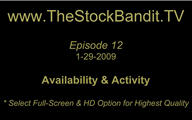Fridays are common days of the week when more part-time traders are off work or home early, leaving them much more available to do some trading. It sure beats going to the office, right?
But what’s often times forgotten is the fact that just because you’re available does not mean you need to be active in the market. Let that concept sink in for a minute, and consider those occasions when you were just itching to do some trading. Chances are, it cost you some money. That’s what tends to happen when trades are forced.
So here in Episode 12, I want to give you a reminder of a few things to avoid stepping into the trap of overtrading on those days when you’re vulnerable to it. Particularly when the present conditions are catering to it!
(Be sure to click the full-screen option for best viewing.)
Hope you enjoy the show! Thanks for watching and subscribing, and feel free to post your ideas and comments down below.
Trade like a Bandit!
Jeff White
President, TheStockBandit, Inc.
www.TheStockBandit.com (Premium service)
www.TheStockBandit.net (Trading Blog)



















January 31st, 2009 at 6:05 pm
Perhaps you could articulate cleanly in terms of a possible rule when we shoudl be taking trades in general and when not. I know i struggle with this. I have a short term timing mechanism that I think I like BUT I still struggle with when to trade and not trade as a general rule.
the result is that I often have great runs of winning trades.. which are followed by great runs of loosing trades. This makes me think it’s not what I’m doing or picking but that it’s the market and WHEN I’m choosing to participate. But I can’t seem to articulate that concept into a red light to keep me clearly out
February 1st, 2009 at 2:42 pm
Hey Thomas,
Thanks for visiting and I appreciate your comments. Keep ‘em coming!
As for when to trade and when not to trade, I really just think it boils down to knowing your method and which conditions are most accommodating. For example, breakout traders need to wait for trends to be present before really becoming aggressive with buying new highs or shorting new lows. On the contrary, a range-bound market is ideal for reversal players who like to buy support and sell resistance.
So it’s extremely important to know what your style is (first), and then (second) to wait for those ideal conditions to arrive. If the environment is well-suited to your plays, then get busy and trust your method. If you aren’t seeing much of what you like, then sit on your hands or trade very small and be selective.
None of us ever know what the market is about to do, but each of us can objectively evaluate what’s taking place right now at this moment and then act accordingly.
I may elaborate on this via video at some point, but hope this helps in the meantime!
Jeff
February 1st, 2009 at 11:17 pm
Thank you. It does help. Ive been so beaten up lately that I’ve begun skipping trade signals.. mainly because the long side reversal plays have been pathetic performers. That said I’m ashamed to say that many of my shorts have generaly knoced me out and either I take a different trade later OR skip a 2nd or 3rd signal becasue of XYZ reasons(indicators not confirming or such and such) and THAT is the move I was fishing for.
also finding that short entries are not as efficient for my method .. the volitility, or maybee it’s me but often I’m right but at the wrong time OR perfect example I select 2 - 3 to go short. one is NICE winner and the other two are small or moderate loosers.
Two orders fill and one locks me out (buy stop), Guesh which order DIDN’T get filled. It’s really frustrating.
February 2nd, 2009 at 12:37 am
Thomas, we have all been there at times. Whenever the market is causing us frustration, the best we can do is ride it out and focus on damage control in the meantime.
With that said, consider focusing on trading smaller size so that if the frustration continues for a little while that you don’t dig much of a hole.
It’s always easier to bump up your trade size once you get back into a groove, so until then keep doing the things well which you are able to control.
Jeff